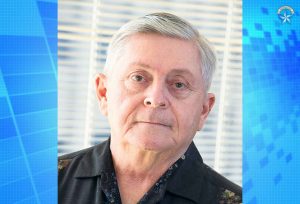

EDITORIAL|ISLAND VOICES
Why I support medical aid in dying
By John Radcliffe
November 12, 2017
I have stage 4, multiple organ, terminal cancer. I have been fighting this horrible disease with every weapon known to medical science since the day I was diagnosed in the summer of 2014. Back then, the doctors determined that the disease was inoperable and terminal.
Earlier this spring my doctor determined that surgery to remove the diseased part of my colon was possible. The surgery took place in July and was successful, and for a moment, I hoped that by removing the original site of the disease, my liver tumors might recede.
Unfortunately that was not the case. In fact, the cancer has now spread to my lung.
But I’m still fighting. I’ve just undergone my 52nd round of chemotherapy. The fight will go on until I’m cured … or until my doctors, my family and I have determined there is nothing left to be done. If/when that time comes, I believe I should have the legal option to request and obtain a prescription from my doctor for life-ending medication, so I can die peacefully at home, in my sleep, surrounded by my loved ones, at the time of my choosing — and my doctor will not have to fear prison for exercising his judgment.
Medical aid in dying is the medical practice in which a terminally ill, mentally capable adult who has a prognosis of six months or less to live can request and obtain medication to end the suffering if it becomes unbearable. Medical aid in dying is authorized in six states — Oregon, Washington, Vermont, Montana, California and Colorado, as well as the District of Columbia — with a combined total of 40 years of experience with this end-of-life option. The law works as intended, with proven safeguards and none of the abuses opponents claim.
I am forever grateful for the compassionate, capable people in Hawaii’s hospice and palliative care fields. They do the work of angels. Medical aid in dying simply provides another option in the spectrum of end-of-life care. Even the most powerful medication sometimes is not enough to alleviate the excruciating pain, suffering and anxiety that can come with a terminal prognosis.
More importantly, some of us don’t wish to be subject to “terminal sedation,” given massive doses of morphine at someone else’s discretion until we lose consciousness and eventually stop breathing. When we have tried everything, battled for months (or in my case years) with all the tools in the oncologist’s arsenal, and in the end exhausted all hope of a cure, this final decision should be up to the individual.
Opponents within Hawaii’s small but vocal minority say that they support the concept, but that Hawaii’s medical community is “not ready” to adopt medical aid in dying. Hogwash. According to a November 2016 statewide survey by Anthology Marketing Group, 80 percent of Hawaii voters support medical aid in dying, across all demographics, including age, ethnicity, religion and geographic location.
Many large, secular health-care systems in California, Oregon and Colorado have adopted policies supportive of their patients who choose medical aid in dying and their doctors who practice it. This list includes such respected institutions as Kaiser, UCSF, UCLA, Cedar Sinai and Sutter Health. If they can do it, we, in the land of aloha, certainly can. And we must.
A bill to authorize medical aid in dying in Hawaii came very close to passing this year. Unfortunately, death is a subject many are not comfortable discussing, and despite overwhelming support in the state Senate, this well-crafted bill was deferred in the midst of a legislative shake-up. But we cannot wait. People are suffering. Speak up — to your lawmakers, your doctors, your family and your friends. It is time for “aloha” to also mean mercy under the law.
John Radcliffe is co-founder and president emeritus of Capitol Consultants of Hawaii. He is a veteran union leader, educator and governmental and political action specialist.
-###-

Fresh breath of life does not end lobbyist’s fight over death
By Lee Cataluna
August 6, 2017

On July 10, surgeons removed part of John Radcliffe’s colon. As of now, the cancer in his colon is gone. But, he’s telling friends, don’t get too excited. It’s not a reprieve.
John H. Radcliffe, a retired Hawaii lobbyist who became, as he puts it, the “poster child” for legalizing medical aid in dying in Hawaii, got some astounding news last month.
His inoperable cancer was deemed operable.
He sent out an email updating his status with the jaunty subject line, “Can’t get death right.”
On July 10, surgeons removed part of Radcliffe’s colon. As of now, the cancer in his colon is gone.
But, he’s telling friends, don’t get too excited. It’s not a reprieve.
“Cancer has a sense of humor,” he said. “It just might skip this and go somewhere else.”
In June 2014, Radcliffe was diagnosed with metastasized and inoperable cancer in multiple organs. The bulldog lobbyist and former union leader who had a well-earned reputation for being a hard-charger had been feeling tired. At that initial diagnosis, Radcliffe was given six to 24 months to live.
He began thinking about end-of-life options, how he would fight as best he could but didn’t want to suffer needlessly in the end. He threw his support behind efforts to legalize medical aid in dying in Hawaii, supporting legislation that would allow terminally ill, mentally capable people to self-administer prescribed medication that would bring about a peaceful death rather than a painful, protracted end. The former lobbyist didn’t lobby, though.
“All I could do was basically be a symbol, to look like someone who deserves a choice like this, and to give some speeches,” he said.
The bill, which drew passionate testimony from hundreds of people both for and against, did not advance out of the state House Health Committee.
During the legislative session, as he was giving speeches and interviews, Radcliffe continued receiving chemotherapy even on the floor of the Senate. His last day of chemo was on May 24, his 75th birthday.
In the coming weeks, Radcliffe will have a CT scan to see if the cancer has spread to his lymphatic system. His surgeon told him that the lesions on his liver now do not appear deep.
“That could mean that surgery or radiation might become available,” Radcliffe said. That means there’s a small chance that the cancer in his liver could be essentially cured, he said. “Oh, yeah, there may be cancer in my lung, too, but that is not doing anything — we think.”
Radcliffe plans to go back to the Legislature next session to resume the fight.
“The whole point anyway is not that any miracle occurred but rather, sometimes — whether incrementally or in a blinding flash — discipline, medical science, positive thinking, good wishes and just plain luck combine to work. Or it was a miracle? Miracle is on the table.”
Radcliffe’s condition is still terminal. What he has now is more time.
“Will I continue to seek legislation to permit death with dignity? Yes, of course. Nothing has changed,” he said. “Fighting cancer includes not letting the sonofabitch win by controlling death.”
Reach Lee Cataluna at 529-4315 or [email protected]
ORIGINAL STORY BEHIND PAYWALL HERE
